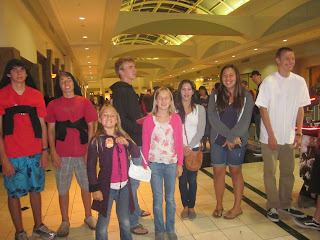![Shadow of a Doubt [VHS]](http://ws.amazon.com/widgets/q?MarketPlace=US&ServiceVersion=20070822&ID=AsinImage&WS=1&Format=_SL160_&ASIN=0783236352&tag=thegree08-20) Charles Oakley (Joseph Cotten) is being followed by a couple of mysterious men so he decides to get away and visit his sister's family out west in Santa Rosa, California. His niece Charlotte Newton (Teresa Wright), who was named after "Uncle Charlie," is especially happy about his visit. But a couple of journalists who've picked the Newton family for a survey of the "average American family" seem to make Uncle Charlie nervous. One of them reveals to "young Charlie" that they're actually detectives who suspect her uncle of being the notorious "Merry Widow Murderer." Uncle Charlie's strange behavior makes young Charlie suspicious as well.
Charles Oakley (Joseph Cotten) is being followed by a couple of mysterious men so he decides to get away and visit his sister's family out west in Santa Rosa, California. His niece Charlotte Newton (Teresa Wright), who was named after "Uncle Charlie," is especially happy about his visit. But a couple of journalists who've picked the Newton family for a survey of the "average American family" seem to make Uncle Charlie nervous. One of them reveals to "young Charlie" that they're actually detectives who suspect her uncle of being the notorious "Merry Widow Murderer." Uncle Charlie's strange behavior makes young Charlie suspicious as well. "Shadow of a Doubt" was nominated for an Academy Award and is considered to be one of Hitchcock's finest films (he said it was his favorite among his American films). According to biographer Patrick McGilligan, this is what Hitchcock called a "run for cover" film, like "North by Northwest," another of my favorites. The initial script was written by Thornton Wilder who wrote Our Town, lending not only an "American" flavor but also a touch of morbidity. But Hitchcock's scripts always went through multiple rewrites, almost always by him and his wife, Alma.
As I've been gradually watching Hitchcock's movies I'm always impressed by how skillfully he creates and heightens suspense through the story, and he sometimes adds subtle humor at the same time. In this one, young Charlie's father (Henry Travers, who later played Clarence in "It's a Wonderful Life") shares a keen interest in crime stories with his neighbor, Herbie (Hume Cronyn in his film debut). The two constantly discuss ways to commit the perfect crime - usually in front of Uncle Charlie - which is kind of funny and adds suspense since that's what he is suspected of doing. And when you watch it notice the chilling effect of the ominous black smoke that billows out of the train when Uncle Charlie arrives.
As for the suspicious rolled-up carpet, it turned out there was no body inside. But I hear it was quite funny watching the boys cautiously creep up to it, saying "you look," "no, you look."


















